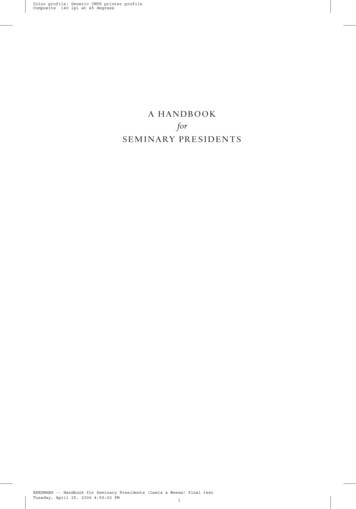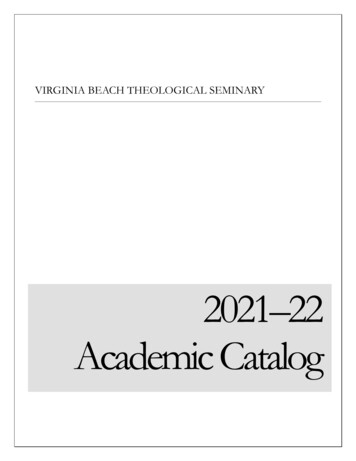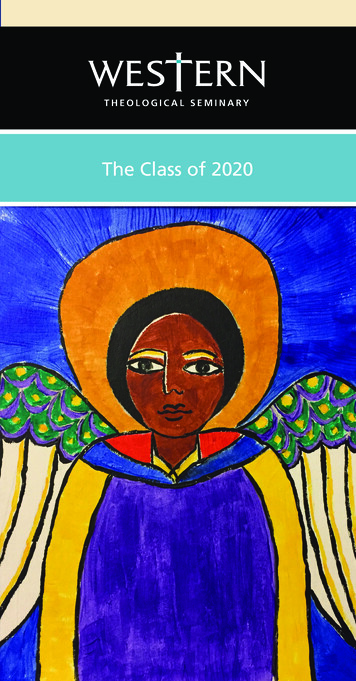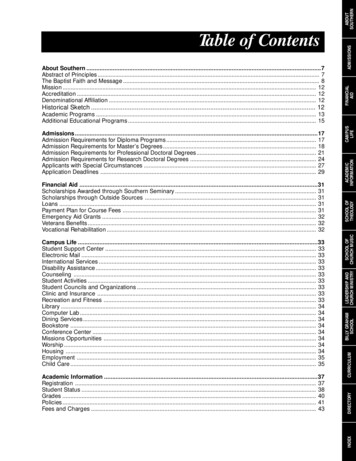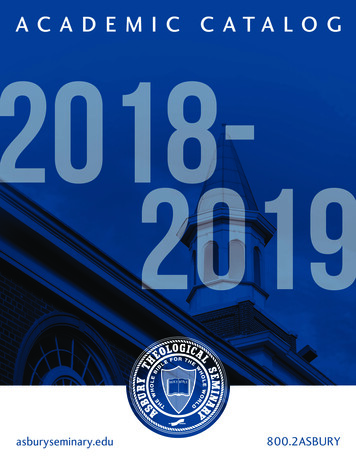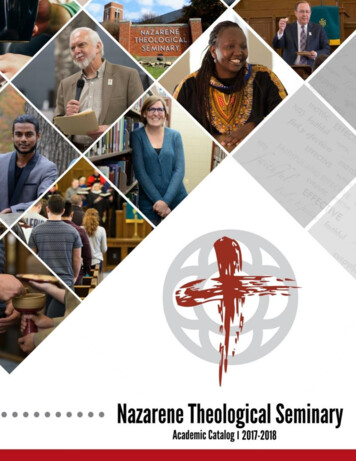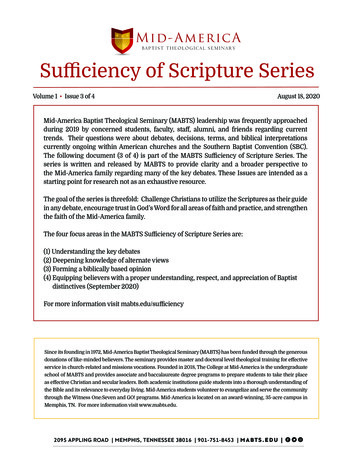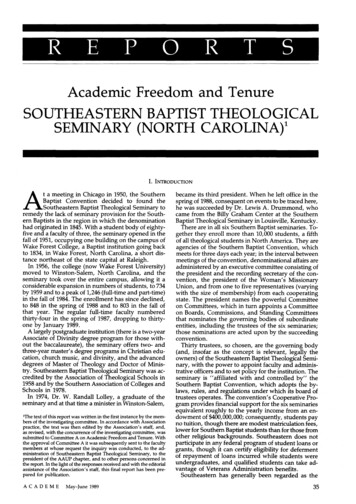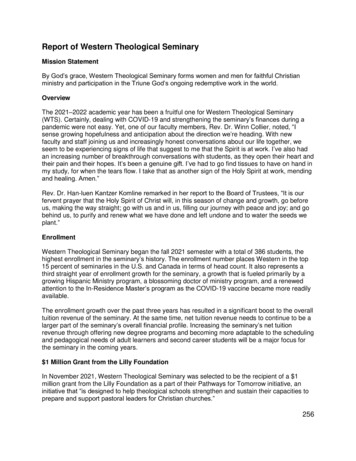
Transcription
Report of Western Theological SeminaryMission StatementBy God’s grace, Western Theological Seminary forms women and men for faithful Christianministry and participation in the Triune God’s ongoing redemptive work in the world.OverviewThe 2021–2022 academic year has been a fruitful one for Western Theological Seminary(WTS). Certainly, dealing with COVID-19 and strengthening the seminary’s finances during apandemic were not easy. Yet, one of our faculty members, Rev. Dr. Winn Collier, noted, “Isense growing hopefulness and anticipation about the direction we’re heading. With newfaculty and staff joining us and increasingly honest conversations about our life together, weseem to be experiencing signs of life that suggest to me that the Spirit is at work. I’ve also hadan increasing number of breakthrough conversations with students, as they open their heart andtheir pain and their hopes. It’s been a genuine gift. I’ve had to go find tissues to have on hand inmy study, for when the tears flow. I take that as another sign of the Holy Spirit at work, mendingand healing. Amen.”Rev. Dr. Han-luen Kantzer Komline remarked in her report to the Board of Trustees, “It is ourfervent prayer that the Holy Spirit of Christ will, in this season of change and growth, go beforeus, making the way straight; go with us and in us, filling our journey with peace and joy; and gobehind us, to purify and renew what we have done and left undone and to water the seeds weplant.”EnrollmentWestern Theological Seminary began the fall 2021 semester with a total of 386 students, thehighest enrollment in the seminary’s history. The enrollment number places Western in the top15 percent of seminaries in the U.S. and Canada in terms of head count. It also represents athird straight year of enrollment growth for the seminary, a growth that is fueled primarily by agrowing Hispanic Ministry program, a blossoming doctor of ministry program, and a renewedattention to the In-Residence Master’s program as the COVID-19 vaccine became more readilyavailable.The enrollment growth over the past three years has resulted in a significant boost to the overalltuition revenue of the seminary. At the same time, net tuition revenue needs to continue to be alarger part of the seminary’s overall financial profile. Increasing the seminary’s net tuitionrevenue through offering new degree programs and becoming more adaptable to the schedulingand pedagogical needs of adult learners and second career students will be a major focus forthe seminary in the coming years. 1 Million Grant from the Lilly FoundationIn November 2021, Western Theological Seminary was selected to be the recipient of a 1million grant from the Lilly Foundation as a part of their Pathways for Tomorrow initiative, aninitiative that “is designed to help theological schools strengthen and sustain their capacities toprepare and support pastoral leaders for Christian churches.”256
The grant has two parts. The first part of the grant will be used to fund initiatives related to theEugene Peterson Center for Christian Imagination. The center, which was established inFebruary 2020, exists to promote the pastoral theology of Eugene Peterson for futurescholarship, the health of pastors, and the church’s renewed imagination. The center willsteward the Peterson papers and archives, promote robust learning, create generative modelsfor pastoral formation, and provide resources to encourage pastors for sustainable, joyful, andcourageous ministry. The center launched three Doctor of Ministry cohorts over this past year.The first two were fully subscribed with 20 students per cohort. The third one will begin inOctober 2022 and will be taught by Drs. Jeff and Karen Barker (emeritus professors,Northwestern College).The second part of the grant will be used to grow the burgeoning Hispanic Ministry Program atWestern. The grant will enable Western to hire another bilingual Spanish-English facultymember so that the seminary can offer a Master of Arts in Christian Studies program in theSpanish language, as well as support the highly subscribed Graduate Certificate in PastoralStudies program and the doctor of ministry cohorts in Spanish. Beginning in the summer of2023, the seminary will also host a weeklong Hispanic Summer Institute program in Holland,Michigan.Founders’ DayThe seminary launched the inaugural Founders’ Day lecture. The lecture is designed to reflecton specific time periods over the course of the institution’s history in order to draw wisdom forthe present and strength for the future. The inaugural lecture will be given by Dr. David Komline,associate professor of church history, and is titled, “On Being Reformed: The Theological Visionof I. John Hesselink.”New Master’s ProgramsAccording to the Association of Theological Schools (ATS), while enrollment in master of divinityprograms has declined by 17 percent over the last 15 years, the decline has also been balancedby the accelerating enrollment growth of 18 percent over just the last 5 years in various MAprograms. For the first time in the history of ATS, MDiv credit hours represent less than 50percent of total credit hours across all seminaries.In response to this trend, the faculty of Western Theological Seminary unanimously andenthusiastically approved four new master of arts programs in the following areas: Master of Arts in Biblical StudiesMaster of Arts in Disability and MinistryMaster of Arts in MinistryMaster of Arts in TheologyThe faculty also authorized a Spanish-language master of arts in Christian Ministry, whichmeans that the seminary now has full degree Spanish-language offerings at the certificate level,master’s level, and doctoral level.257
Strategic PlanOver the past 18 months, the seminary has intentionally engaged a strategic plan process thatwill guide the focus of the seminary for the next three years. We anticipate that the strategicplan will be approved by the Board of Trustees at the May board meeting. The four themes ofthe strategic plan are as follows:1. By June 2025, WTS will have developed and launched new degree programs andinitiatives that equip students and churches to faithfully and innovatively engage thecultural and ecclesial challenges of ministry and leadership in our time.2. By June 2025, WTS will be a vibrant learning community marked by the intentionalintegration of rigorous theological education with holistic spiritual formation.3. By June 2025, WTS will increase its capacity and capability to support and sustainprograms through investment in technology, institutional processes, and endowment forstudent scholarships, academic chairs, and institutional operations.4. By June 2025, WTS will have solidified its commitment to a biblically rooted vision ofracial/ethnic diversity and to practices of reconciliation and will have grown itsinstitutional capacity for intercultural competency.Trustee ChangesTrustees Gail Ebersole (chair), Chris Crawford, and Kerm Campbell will conclude their terms ofservice on June 30, 2022. No new trustees were elected to the board this academic year.Faculty NewsOn April 11, 2022, dean and vice president of academic affairs Dr. Kristen Deede Johnson wasinstalled to the G.W. and Edna Haworth Chair of Educational Ministries and Leadership.The G.W. and Edna Haworth Chair of Educational Ministries and Leadership was originallyestablished in 1999 during the presidency of Rev. Dr. Dennis Voskuil. Rev. Dr. George Brownoccupied the chair until his retirement in 2012. The chair was redirected in 2021 to support thework and office of the dean of the seminary, allowing much needed financial resources to berechanneled toward other core teaching functions of the seminary while still providing thenecessary resources for the dean to conduct research, writing, and publication, three primaryresponsibilities that are often sacrificed when a faculty member moves into administration andgives oneself to the task of adminis-trivia.The inaugural lecture, delivered by Dr. Kristen Johnson, was titled “Cultivating KingdomImagination: A Vision of Discipleship and Institutional Engagement.” Responses to the lecturewere given by Dr. James Davison Hunter, LaBrosse-Levinson Distinguished Professor ofReligion, Culture, and Social Theory at the University of Virginia; Dr. John Inazu, Sally D.Danforth Distinguished Professor of Law and Religion and Professor of Political Science atWashington University in St. Louis; and Rev. Fleming Rutledge, Episcopalian priest,distinguished theologian, and accomplished author.258
Below please find a non-exhaustive sampling of faculty engagement and activities with thechurch and with the academy throughout the course of the year. Dr. Carol Bechtel is entering a season of travel to introduce her Bible studycurriculum, Celebrating Sabbath: Accepting God’s Gift of Rest and Delight, which shewrote as the national Bible study for Presbyterian Women, the women’s organization ofthe Presbyterian Church (U.S.A.). In March 2022, she traveled to Phoenix, Arizona, tospeak for the Presbytery of the Grand Canyon. In April, she will head to Montreat, NorthCarolina, for the Presbytery of Western North Carolina. In late April, she will be leading aSabbath retreat for RCA women at Warwick Conference Center in Warwick, New York.She is also preaching on Palm Sunday at the Waldensian Presbyterian Church inValdese, North Carolina. She would appreciate your prayers for traveling mercies! Dr. Chuck DeGroat has continued a full schedule of speaking and of leading retreats.He writes, “In January, I led a three-day intensive retreat in my ongoing work as a facultymember for the Soul Care Institute.” He has also traveled out to Silicon Valley to do aretreat for alumni pastors and leaders of the Bay Area’s Wellspring Soul Care program,done some training and soul care from a distance with the faculty of the John BrownUniversity clinical mental health program, and offered an online seminar for GravityLeadership in March on mental health for leaders in the church today. He also shares,“Beyond this, I’m involved in a number of conversations right now about the current stateof the church and the trauma of spiritual abuse. One of these conversations has been anongoing one with Mike Cosper at CT [Christianity Today], consulting for the podcast TheRise and Fall of Mars Hill. I’m also involved in a conversation with other leaders aroundhow to help churches rethink their use of NDAs [non-disclosure agreements]. And Icontinue to counsel a number of pastors.” Dr. David Komline led a three-week adult education course at Thornapple CommunityChurch in Grand Rapids, Michigan, and attended the final meetings of the Commissionon Theology before his term expires at the end of June 2022. He also helped to authorthe commission’s report to General Synod 2022. He is scheduled to attend theConference on Faith and History in his capacity as book review editor for theirjournal Fides et Historia in late March and to deliver the inaugural WTS Founders’ DayLecture, “On Being Reformed: The Theological Vision of I. John Hesselink” in April. On January 27, Dr. Han-luen Kantzer Komline gave a lecture in this year’s Scriptureand Ministry series at Trinity Evangelical Divinity School entitled “The Art of Willing.”During the same visit, she also delivered an evening address entitled “Augustine in thePulpit” and participated in the Stott Award Consultation, which brings together pastors,parishioners, and professors to discuss theological topics of relevance to thecontemporary life of the church. Her essay “Calvin and Przywara’s Analogia Entis: ANew Start for an Old Debate” was published in Pro Ecclesia in March. She is grateful forthe feedback on this piece from colleague Dr. Todd Billings! She also recently completedan essay on Augustine’s preaching on grace and human willing for the CambridgeCompanion to Augustine’s Sermons. She is learning the ropes of serving as a co-editorof the International Journal of Systematic Theology and has been serving on the searchcommittee for the new executive director of the Foundation for Theological Education inSoutheast Asia.259
Dr. Suzanne McDonald writes, “It was a joy to be the Teacher-in-Residence at CentralReformed Church in Grand Rapids over the month of March. The theme was ‘Walkingwith the Spirit.’ I preached and led worship, and we explored aspects of the person andwork of the Holy Spirit through adult education sessions, a weekly evening readinggroup over Zoom, and informal discussion times. On the weekend of the 2nd and 3rd ofApril, I will be at Granite Springs Church in California, leading a Saturdaymorning seminar on ‘Dealing Faithfully With Dementia,’ and preaching on the Sundaymorning.” Dr. McDonald will also be teaching a three-part adult education series at ThirdReformed Church in Holland, Michigan, on May 8, 15, and 22 titled “In the End, What?:Thinking Well About Eschatology.” Dr. David Stubbs’s article “Visiting Prisoners in Jesus’ Day,” to be printed in ChristianityToday 66/3 (April 2022), has just been day.html). Also, he has given presentations on “Visiting the Prisoner . in aClassroom,” to two classes at Hope College and at Rose Park Reformed Church inHolland, Michigan, this last month. The Hope-Western Prison Education Program isbusy recruiting its second cohort—and they will be transferred to the MuskegonCorrectional Facility and start orientation in July. Dr. Travis West is grateful and excited to report that he recently signed a contract withTyndale Publishers to publish the book on Sabbath he began working on during hissabbatical in the spring of 2021! It is likely going to be part of their new Refresh Series,which focuses on practices for embodied faith that lead to health, wellness, and shalom.The tentative title is The Art of the Sabbath. He has also been a co-editor (along withRev. April Fiet, WTS alum ’07) for the Women of the Bible study series produced by theRCA, celebrating the stories of female characters in the Bible on behalf of the wholechurch. The first volume was released at the beginning of the COVID-19 pandemic, andthe second volume was released this spring. The third volume is currently being edited. Finally, this year we also said farewell to two important lives in the history of theinstitution. Mrs. Lenora Ridder, wife of former president Dr. Herman “Bud” Ridder,passed away on March 19. Dr. Bill Brownson, former professor of preaching andpresident emeritus of Words of Hope, passed away on April 1.New FacultyWestern Theological Seminary is pleased to announce the hiring of three new faculty membersto join its core faculty. These faculty members are: Dr. Tim Basselin, director of student formation and community life (Fuller TheologicalSeminary)Dr. Ruth Padilla DeBorst, Richard C. Oudersluys Associate Professor of WorldChristianity (Boston University)Dr. Madison Pierce, associate professor of New Testament (University of Durham)Staff Retirement260
Norm Donkersloot, vice president of finance, concluded 35 years of faithful and committedservice to the seminary on March 20, 2022. Norm is a man of integrity and always had the bestinterests of the seminary at heart. He served under four different presidents, beginning withMarv Hoff, then Dennis Voskuil, Tim Brown, and concluding with the current administration. JonDockery has been named as chief financial officer and vice president of finance.ResolutionDeclaring James V. Brownson General Synod Professor EmeritusRev. Dr. James V. Brownson, professor of New Testament, retired from Western TheologicalSeminary effective August 27, 2021. In honor of his faithful service, President Theonugraha andDean Johnson, together with the Board of Trustees and faculty of Western TheologicalSeminary, therefore recommend that he be declared retired and that a resolution be brought tothe 2022 General Synod to declare him a General Synod professor emeritus.TE 22-3WHEREAS Dr. James V. Brownson, James and Jean Cook Professorof New Testament, was a student at Western from 1977 to 1980, andwas selected by the faculty to be the recipient of the Henry J.Pietenpol Senior Excellence Award; andWHEREAS Dr. Brownson was then ordained in the Reformed Churchin America in 1980 and served as an associate pastor at FaithReformed Church in Traverse City, Michigan; andWHEREAS Dr. Brownson then went on to earn a Doctor ofPhilosophy degree from Princeton Theological Seminary; andWHEREAS Dr. Brownson then returned to serve as assistantprofessor of New Testament in 1989 until his retirement in 2021; andWHEREAS Dr. Brownson also served as the academic dean of theseminary from 1996 to 2004, and then again as interim academicdean from 2015 to 2016; andWHEREAS throughout his time at WTS, Prof. Brownson hasdistinguished himself as a teacher, scholar, author, andadministrator, forming generations of students through his teaching,the Reformed Church in America through his consistentdenominational service, the wider church through his writings, andthe ongoing shape of WTS curricula and academic programsthrough his administration, Dr. Brownson’s legacy will long endure;THEREFORE, BE IT RESOLVED that the 215th regular session of theGeneral Synod of the Reformed Church in America, meeting atCentral College in Pella, Iowa, on June 9–14, 2022, expresses itsdeepest gratitude to Dr. Brownson for his years of service, andoffers its prayers for a fulfilling retirement;261
AND BE IT ALSO RESOLVED that the Rev. Dr. Jim Brownson bedeclared a General Synod professor emeritus as of June 15, 2022.Request to the General Synod for Western to be an “Officially Related” InstitutionThe Board of Trustees of Western Theological Seminary requests permission from the GeneralSynod to permit the seminary to become an officially related institution of the RCA like HopeCollege, Northwestern College, and Central College. We believe that moving to an officiallyrelated status will result in many mutually beneficial outcomes for both the denomination and theinstitution.According to the Association of Theological Schools (ATS), we are in the middle of a significantsea of change in theological education. ATS is projecting that sometime in this decade, the totalnumber of racial/ethnic minority students enrolled in ATS schools will exceed that of whitestudents. Western Theological Seminary is experiencing some aspects of this change as well.Seven out of fourteen admitted in-residence students for fall 2022 are students of color,including five African American students; eight out of fourteen admitted distance-learningstudents for fall 2022 are students of color, including five Latino students from the Los Angelesarea.Altogether, theological education is in the midst of a demographic transition that will continue toaccelerate through the end of the decade. According to ATS, 25 years ago, the most commonstudent in ATS schools would have been a white male student from a mainline tradition,studying in-residence in the MDiv program, attending a seminary that belongs to the samedenomination as their parents, funded by the denomination, and preparing for ministry in thatsame denomination.By the end of this decade, the most common student in theological education will be aracial/ethnic minority student from a broadly Protestant tradition, equally likely to be male orfemale, equally likely to enroll in an MA program as an MDiv program, studying part-time as acommuter/distance-learning student, attending a seminary that does not belong to the samedenomination as their parents, or altogether non-denominational, not funded by a denomination,and not pursuing ministry in a denomination. Geographical proximity will, by far, become thesingle most important factor in the seminary selection process, followed by theologicalalignment.Responding to these trends is the foundational motivation for Western’s request to the GeneralSynod. We seek to place the seminary in a position that will allow us to respond with agility andcreativity to meet the changing demands for theological education so that Western can beincreasingly sustainable for the future. We live in a time of increasing naiveté and unfamiliaritytoward denominations and, by extension, denominational seminaries. The perception ofdenominational seminaries is that they primarily employ faculty who are ordained in thatdenomination and are focused primarily on training students for that denomination. Moving to an“officially related” status will allow Western to better recruit and foster relationships with abroader prospective student pool, including students from other denominations and churchnetworks.Delegates may recall that the seminary’s original request, submitted to General Synod 2021,was to become an “affiliated” institution of the RCA. This request was referred to the GeneralSynod Council (GSC) in consultation with the Commission on Church Order (CCO) for further262
consideration. In January, the CCO made its advisory response available. The commission’sresponse focused on four areas:1. Instead of being “affiliated” with the RCA, the provision given by the Book of ChurchOrder (BCO) is for Western to become an “officially related” institution of the RCA.2. The BCO outlines two criteria for an institution to become an “officially related”institution:a. The institution’s organizing documents must be approved by the General Synod.b. The institution’s governing board must include three General Synod–appointedtrustees at all times.3. The CCO recommends that a reversion clause of the seminary’s assets be included sothat if the seminary ever ceases operation, the assets will revert to the RCA.4. Any amendments to the bylaws regarding the three General Synod–appointed trusteesas well as the reversion of assets clause would require approval by the General Synod.The Board of Trustees of Western Theological Seminary has reviewed these recommendationsand has unanimously affirmed the acceptance of these four recommendations. Westerntherefore presented to the GSC in March 2022 an updated set of amendments to its bylaws andarticles of incorporation that took these four recommendations into account. As directed by theGeneral Synod in TE 21-5, the updated proposed amendments to WTS’s bylaws and articles ofincorporation are included in the GSC’s report on referrals from General Synod 2021; pleasesee pages 81-109 of this workbook.The CCO also recommended to the GSC that, should the General Synod approve the proposedamendments to WTS’s bylaws and articles of incorporation, the GSC consider bringing arecommendation to the General Synod to designate Western Theological Seminary as an agentof the General Synod in order to best serve students who are currently seeking their Certificateof Fitness for Ministry at the seminary. The seminary is amenable to this recommendation aswell, while also noting that the three theological agents have requested further review of thenecessity of the Certificate of Fitness for Ministry (CFM) for the theological agents.Should the General Synod choose to approve the proposed amendments to Western’s bylawsand articles of incorporation (RF 22-1; see pages 88-98) but not to subsequently designateWestern as a theological agent (RF 22-2; see page 98, the board of the Ministerial FormationCertification Agency has agreed to grant CFMs to students at Western who have submitted theirForm V to the seminary by June 30, 2022, and who have satisfied the seminary’s institutionalrequirements for receiving the CFM.In conclusion, the Board of Trustees of Western Theological Seminary formally requestsapproval from the General Synod for WTS to become an officially related institution of the RCA.263
Report of Western Theological Seminary Mission Statement By God's grace, Western Theological Seminary forms women and men for faithful Christian ministry and participation in the Triune God's ongoing redemptive work in the world. Overview The 2021-2022 academic year has been a fruitful one for Western Theological Seminary (WTS).
